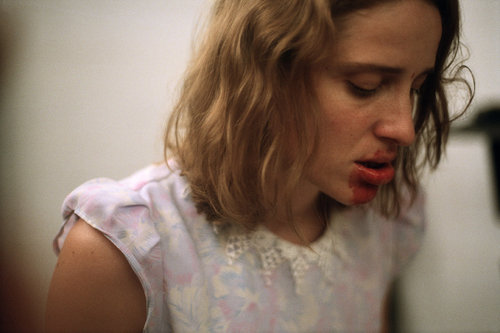All in the Family: Dogtooth Is a Dark Parable of Family as Constructed Reality

A prolonged shout-out to the power of nurture over nature, Dogtooth centers on a Greek businessmen and father (Christos Stergioglou) who lives with his family in an Edenic, gated compound of green lawns and swaying palm trees in an unidentified rural section of Greece. The father has created his own disturbingly self-defined utopia inside. Behind the wall that encircles his family compound/prison live his three children: his eldest daughter (Aggeliki Papoulia), daughter (Mary Tsoni), and son (Hristos Passalis). The children are well into their 20s but live in a state of absurdly arrested adolescence, utterly defined by the rules set out by their parents and preoccupied — like very young children — with the stickers their father gives out as rewards for good behavior. The alternate universe the father has created is not without its idyllic qualities. Protected from the real world anxiety of relationships, conflict, work, and the ordeals of adult life, they instead while away their days swimming, playing silly games of make-believe and concocting activities and challenges to pass the time. Their greatest anxiety is pleasing their parents who dole out equal portions of love and discipline, meting out the latter — often violently — if they misbehave. The wife (Michele Valley) is her husband’s co-conspirator, carrying out his strange imperatives, the enforcer who punishes their children for infractions. She seems to have no will of her own, but exists to do her husband’s bidding.
In an effort to keep them sequestered from the world outside, their minds pure, and imaginations under control, the parents have forbidden their children from ever leaving the compound. Determined to keep his children under his thumb, the father has even created his own fairy tale of what befalls those who dare to cross the threshold to the outside world, and it is as vivid, grotesque, and fear-inducing as any Brothers Grimm tale of dark forests and bad wolves. The parents have also created an alternate vocabulary so that the children will never yearn to know the world outside by discovering the true meaning of “sea,” “motorway,” or “excursion.” When the son asks his mother what “zombie” means, she tells him “a little yellow flower,” a handy diversion complicated when he discovers little yellow flowers in the family’s yard.
The woman who introduced “zombie” to the son and who has given him a glimmer of what lies beyond the compound gates is Christina (Anna Kalaitzidou), a security guard at the father’s factory. Each week, the father blindfolds Christina and brings her back to the compound to have sex with the son. But Christina begins to take advantage of the children’s naivete to serve her own sexual desires, and she begins to represent a troubling, contaminating influence on the children.
Dogtooth has echoes of other films which examine family as an autonomous creation subject to the laws of charismatic patriarchs, from the documentary Surfwise (2007) about a doctor-turned-surfer who dropped off the grid to raise his nine children in a Winnebago to director Michael Haneke’s deeply disturbing exegesis of modern malaise, The Seventh Continent (1989). Based on a true story, Haneke’s film shows a modern Austrian family willingly cutting itself off from society by also opting out in the most dramatic and violent way imaginable.
The world in a bubble that the father has created is utterly patriarchal: He imports Christina to satisfy his son’s sexual urges but in no other way acknowledges that his daughters might have the same desires. As if to intensify his own centrality as protector and mythologist within his egomaniacal kingdom, he creates scenarios that affirm his master of the universe status. He drops fish into the swimming pool and, when his daughter discovers them, adorns himself in flippers, mask, and harpoon gun to save the family from the interlopers. This world the father has created suggests the changing nature of Greek life where a tight, traditional family guided by a father-in-chief has been threatened by contemporary shifts in which families are dispersed and children rebel against its laws. Director Giorgos Lanthimos has said that his intent in Dogtooth was something, “almost science fiction. It started from me wondering about the future of families … maybe at some point they would become extinct for some reason.”

Film still copyright Giorgos Lanthimos
And yet, Lanthimos says, there would be some “obliged to protect what they know.” The blinding white light, the family’s isolated, minimally decorated home and the absence of media or consumer images (the father cuts off all packaging and labels from the objects he brings into the house, and forbids the children from seeing films from the outside world, although he himself consumes pornography) and the otherworldly reality Lanthimos establishes certainly enhances the sense of the Dogtooth universe as science fiction.
But at its heart, the film seems a hyperbolic examination of the family as a universe unto itself, with its own laws, values, government, and order. It is a glimpse into the total control parents can exercise over their children, and the vulnerability of children subject to the whims of their protectors who can also become their tormentors. While watching Dogtooth it is hard not to think of real life perversions of family hidden away from the world, of Jacyee Dugard, kept in a compound and abused by the man who abducted her, or of Josef Fritzl, the Austrian man who kept his own daughter and the children he fathered imprisoned in his home for 24 years. The father’s world is far more loving and protective, but all families, both the good ones and the bad, are defined as institutions set apart from the world at large which either work to help children negotiate the world outside, or keep them imprisoned and away from its influences.
Required viewing for artists and cineastes, Dogtooth addresses an idea countless artists have contended with over time, questioning how reality is defined according to circumstance with any number of factors: economics, family history, social class, nationality, and ethnicity shaping our sense of what is real and true. Think of Adrian Piper with those hilarious business cards given out in social situations to puncture the accepted definition of the world as white and cohesive: “Dear Friend. I am black. I am sure you did not realize this when you made / laughed at / agreed with that racist remark.” Reality is what we make of it — a construct, a phantom — and it is the job of artists to bust it wide open and reveal the nature of its construction.—Felicia Feaster
Dogtooth (2009). Directed by Giorgos Lanthimos. Starring Christos Stergioglou, Aggeliki Papoulia, Mary Tsoni, Hristos Passalis, Michele Valley, Anna Kalaitzidou. In Greek with English subtitles.



Comments